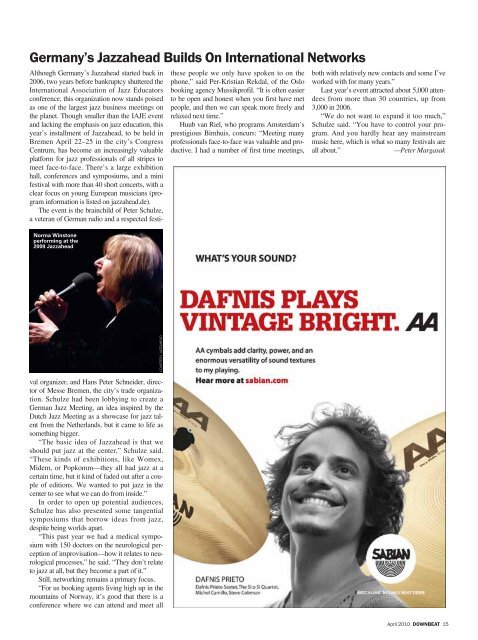Download - Downbeat
Download - Downbeat
Download - Downbeat
- TAGS
- download
- downbeat
- downbeat.com
Create successful ePaper yourself
Turn your PDF publications into a flip-book with our unique Google optimized e-Paper software.
Germany’s Jazzahead Builds On International Networks<br />
Although Germany’s Jazzahead started back in<br />
2006, two years before bankruptcy shuttered the<br />
International Association of Jazz Educators<br />
conference, this organization now stands poised<br />
as one of the largest jazz business meetings on<br />
the planet. Though smaller than the IAJE event<br />
and lacking the emphasis on jazz education, this<br />
year’s installment of Jazzahead, to be held in<br />
Bremen April 22–25 in the city’s Congress<br />
Centrum, has become an increasingly valuable<br />
platform for jazz professionals of all stripes to<br />
meet face-to-face. There’s a large exhibition<br />
hall, conferences and symposiums, and a mini<br />
festival with more than 40 short concerts, with a<br />
clear focus on young European musicians (program<br />
information is listed on jazzahead.de).<br />
The event is the brainchild of Peter Schulze,<br />
a veteran of German radio and a respected festi-<br />
Norma Winstone<br />
performing at the<br />
2009 Jazzahead<br />
val organizer, and Hans Peter Schneider, director<br />
of Messe Bremen, the city’s trade organization.<br />
Schulze had been lobbying to create a<br />
German Jazz Meeting, an idea inspired by the<br />
Dutch Jazz Meeting as a showcase for jazz talent<br />
from the Netherlands, but it came to life as<br />
something bigger.<br />
“The basic idea of Jazzahead is that we<br />
should put jazz at the center,” Schulze said.<br />
“These kinds of exhibitions, like Womex,<br />
Midem, or Popkomm—they all had jazz at a<br />
certain time, but it kind of faded out after a couple<br />
of editions. We wanted to put jazz in the<br />
center to see what we can do from inside.”<br />
In order to open up potential audiences,<br />
Schulze has also presented some tangential<br />
symposiums that borrow ideas from jazz,<br />
despite being worlds apart.<br />
“This past year we had a medical symposium<br />
with 150 doctors on the neurological perception<br />
of improvisation—how it relates to neurological<br />
processes,” he said. “They don’t relate<br />
to jazz at all, but they become a part of it.”<br />
Still, networking remains a primary focus.<br />
“For us booking agents living high up in the<br />
mountains of Norway, it’s good that there is a<br />
conference where we can attend and meet all<br />
COURTESY JAZZAHEAD<br />
these people we only have spoken to on the<br />
phone,” said Per-Kristian Rekdal, of the Oslo<br />
booking agency Mussikprofil. “It is often easier<br />
to be open and honest when you first have met<br />
people, and then we can speak more freely and<br />
relaxed next time.”<br />
Huub van Riel, who programs Amsterdam’s<br />
prestigious Bimhuis, concurs: “Meeting many<br />
professionals face-to-face was valuable and productive.<br />
I had a number of first time meetings,<br />
both with relatively new contacts and some I’ve<br />
worked with for many years.”<br />
Last year’s event attracted about 5,000 attendees<br />
from more than 30 countries, up from<br />
3,000 in 2006.<br />
“We do not want to expand it too much,”<br />
Schulze said. “You have to control your program.<br />
And you hardly hear any mainstream<br />
music here, which is what so many festivals are<br />
all about.” —Peter Margasak<br />
April 2010 DOWNBEAT 15

















